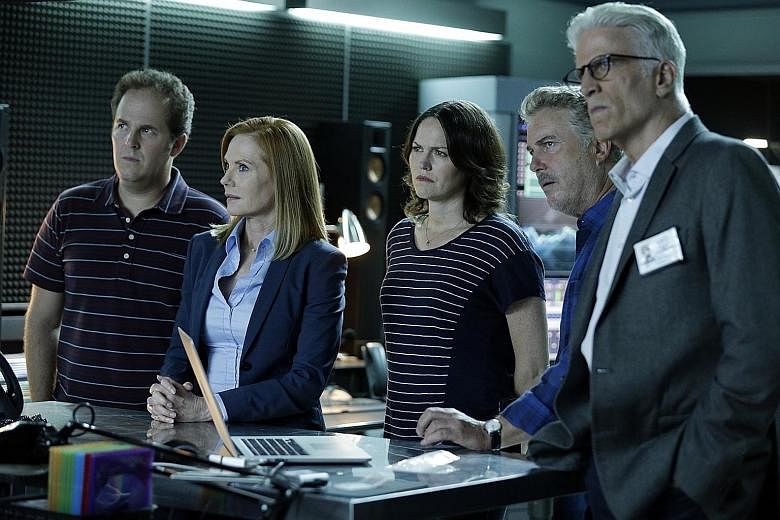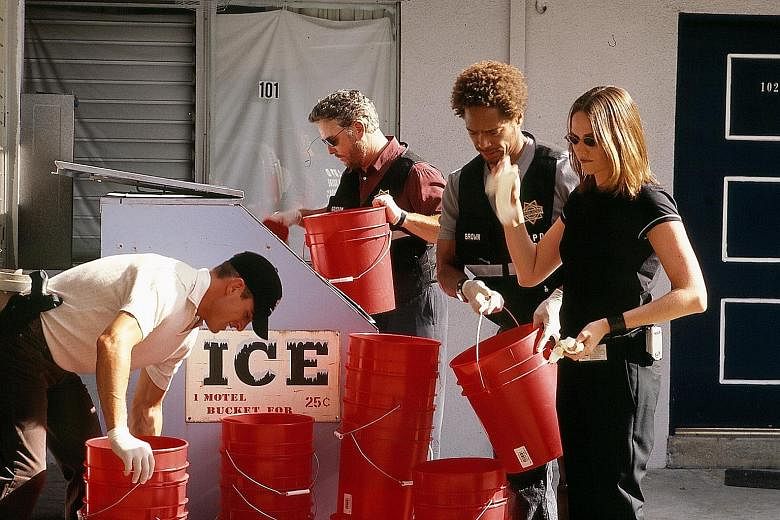After a 15-year run, the show CSI: Crime Scene Investigation said goodbye with a two-hour finale episode that aired in Singapore on Monday (and will be repeated tomorrow).
Before it was cancelled because of falling ratings, it was the most watched TV series in the world for years, with more than 73 million viewers at the height of its popularity in 2009, and six Emmys to its name.
According to original cast member William Petersen, who played Gil Grissom, the influential show leaves a mixed legacy - it revolutionised televised crime dramas but also spawned too many copycat storylines, including its own spin-offs.
On top of that, it may have led to what some call the "CSI effect", which has juries in criminal trials demanding more elaborate and high-tech forensic evidence of the kind depicted on the show - something that has been a big headache for prosecutors and overworked crime laboratories in the United States.
"Now, people go into court and they go, 'Where's the DNA?'" Petersen tells Life and other press in Los Angeles. "And lawyers are constantly coming up to me and saying, 'Thanks a lot for that.'"
The 62-year-old played the lead character - crime-scene investigator and forensic entomologist Gil Grissom - till he left the show in 2008. The finale reunited him with original castmates Marg Helgenberger, 56, and Jorja Fox, 47, whose characters return to work on a case linked to Grissom's past.
Although such "procedural" series are now commonplace, with many shows taking audiences through the technical steps of solving a different criminal, legal or other problem every week, when CSI debuted in 2000 there was nothing else like it, Petersen recalls.
Delving into the nitty-gritty of forensic science on TV was an alien concept back then and even the chief of CBS, the TV network that would air it, had his doubts.
Petersen recalls the reaction of CBS president: "I know Les Moonves was like, 'Um, you're going to dust for fingerprints? That's going to be the TV show? Who's going to watch that? Please don't do that. Be a lawyer. Or how about a policeman with a gun?'"
When work on the first episode began, creator Anthony Zuiker "just had this idea, he hadn't written anything and nobody knew if he could write anything".
"So when we shot the pilot, we were just winging it," says Petersen, who reveals that because CSI was not shot in a studio, but in a warehouse on the outskirts of Los Angeles County, it was "too far away for anybody from the network or the studio" to bother to check regularly on the production.
"We were just left there alone and we got to sort of create it all together. And it was the most amazing thing about the show - that everybody participated.
"There was no Aaron Sorkin or David Chase who had this great idea and worked on it for eight years and said, 'This is how the show is going to be,'" he says, referring to the creators of the TV shows The West Wing and The Sopranos.
"Nobody knew anything about forensics. In fact, after the pilot, we were dragging forensics people in from the police department and saying, 'Hey, could you come over to help us with this? Because we're not sure how to tape-lift a fingerprint.' All that was learnt on the job, and by everybody."
CSI's distinctive visual style - which used computer-generated imagery and unusual camera angles to illustrate everything from the inside of a decomposing body to microscopic traces of evidence at a crime scene - was improvised, too.
"All of a sudden, we realised, 'Oh my god - we've got to shoot inside a bottle. And who's got time for that? So we'd grab a personal assistant and a cameraman and say, 'Go see if you can shoot the inside of that bottle and make it look like something," says Petersen, who also served as an executive producer on the show.
These novel techniques and storylines worked - the show became an overnight sensation, much to everyone's surprise.
"I don't know that anybody had the idea it was going to do as well as it did. It was such a quick, big thing - after just five or six episodes, CBS decided to move us from Friday nights to Thursday nights against Friends and ER. And it was like, 'Really? We're going to compete against these guys? Come on.'
"And we did all right."
Petersen has a theory about why CSI - which would typically see a crime solved, neatly, by the end of each episode, with little time spent on the characters themselves - took off when it did.
"Obviously, the world was looking for it. And I had the sense that it was because of the whole O.J. Simpson trial," he says, referring to the high-profile murder trial of the retired American football player that made headlines all over the world in 1994 and 1995.
"I think people were really confused - it captivated the world for a year and a half and I don't think anybody realised Simpson could just walk out of there. Like, what happened to all this evidence? How did they not convict the guy?
"I also believe that, at least in this country, we were living in a kind of post-modern world where there was a lot of doubt. A lot of people didn't know who to trust, whether it was the government or society."
The show, in contrast, dealt in facts that seemed concrete, dependable and therefore reassuring, even though experts have criticised its depiction of science and forensic procedures as inaccurate.
For viewers, Petersen says, his character was someone who would get to the truth.
"He didn't want the noise of society, he didn't want to listen to the doubt, he was able to just focus on: 'I just want to know what this is. And if I know what this is, I have the truth.' And I think it was comforting for the audience."
Of course, that winning formula was then shamelessly plagiarised by numerous other shows, "even by ourselves", Petersen notes, pointing to the spin-offs CSI: Miami (2002 to 2012) and CSI: NY (2004 to 2013), both of which also attracted large audiences in their heyday.
Of this proliferation of CSI-type storylines and shows on TV, he says: "I wasn't all that happy about that. It's like, 'No, your kid's not as good-looking as mine. I'm sorry, it just isn't.'"
The actor has not watched the latest CSI spin-off, CSI: Cyber - the second season of which will debut in Singapore on Monday - but says: "Were I in charge of the world, the spin-off we would have done would have been in the third or fourth year, and it would have been set in court and been about how you're able to present evidence and get convictions.
"Because that's the whole part we never deal with. Our show ends with: 'We got 'em.' But that isn't the end, believe me - just try to prove that in court, what that hair fibre means to people who haven't seen CSI."
Petersen believes it was the right time for the show - one of the longest-running scripted series to air on US primetime TV - to end, and rules out the possibility of returning for another reunion episode.
"I think we have told all the stories we could tell. When I left in 2008 I didn't feel there was anything more that I could offer it or do with the character in the confines of the show.
"And because there were all the spin-offs, I think there were so many stories being told that sometimes we were repeating each other's stories.''
But he feels immense gratitude that the show continued for 15 years.
"We had a party the other night and there were like 300 people from the 15 years and their lives changed because of it - people got to put their kids through school and buy houses. And that's important in Hollywood - that you take care of the people. That's the part I'll miss the most and that I'm proudest of, in a way.
"I'm thrilled we've entertained people around the world and touched them, in one way or another. But I think there's no more for us to do. All good things come to an end."
CSI: Crime Scene Investigation series finale (a two-hour movie event) airs on AXN (StarHub TV Channel 511) on Thursday at 7.55pm.



